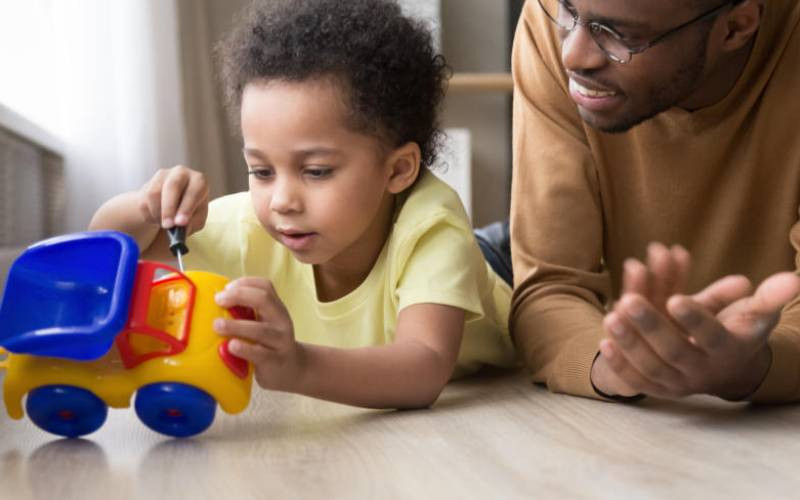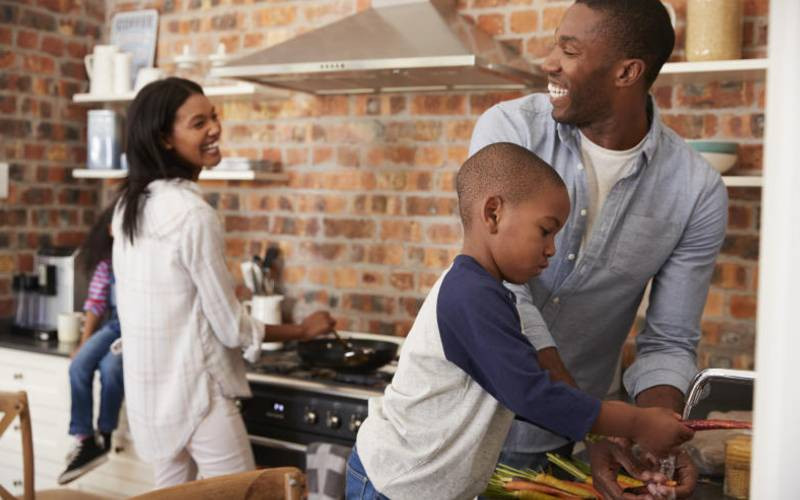
It's believed that around 42 per cent of marriages now end in divorce . In many of these instances young children are involved, which can make the process a lot more painful - and calls for an even more sensitive handling.
If you and your partner have young children, and are calling time on your relationship, communicating this with your kids can be fraught with worry.
Depending on their age, they may not understand the nuances behind your decision, or may blame themselves - and there may be difficult questions to answer.
Some planning can go a long waymand BabyCentre have put together a list of tips to follow, and questions you may be asked...
1. When should we tell our child that we're getting divorced?
If you and your partner are considering a separation or divorce, wait until you’ve made your final decision before talking to your child. Changing your mind further down the line is likely to be confusing and upsetting.
Let them know as soon as a final decision is made, but don't do this weeks in advance. Choose a moment - where possible - where all members who need to present are relaxed and calm, so you can take your time.
Avoid doing it before they go to bed or are being dropped off at school. Offer plenty of hugs and warmth, and tell them that you're happy to answer any questions that they think of now or later.
2. How should we talk to our child about separation or divorce?
Children are literal creatures, so talk to your child in a simple and open way.
They may not have heard the words "divorce" or "separation" before, so if you use these terms, explain clearly what they mean. Be sure to let them know that even though you and your partner won't be living together any more, you'll still be their parents, and they'll still see both of you.
Most importantly, reassure them that they are still going to be cared for and loved by both of you, even if you aren't living together. Also, be prepared for any kind of reaction when you break the news.
Your child is likely to feel sad, frightened, confused or insecure - and it's also possible that she may feel relieved. Reassure her that however she's feeling is perfectly normal. Your child may not react to the news at all to begin with. This is also a natural reaction, and it doesn't mean that they don’t care about what's happened.
3. Tell them together
This one can be tough - especially if you and your partner aren't on good terms. But try and agree on how you'll break the news of the separation and try to do this together.
Not only does this help to show both of you were involved in the decision, but it also helps you to start parenting without being a couple, and reassures your child(ren) that you’ll both continue to be there for them.
4. Tell them it's not their fault
Young children don't understand adult relationships, and often see themselves as the centre of the world. As such, they often think that it's their fault if their parents argue. Reassure your child by explaining gently that separation or divorce is a difficult decision that adults make, and that it isn' t happening because of anything they’ve done.
5. Avoid blaming your partner
You and your partner may be feeling angry or upset with each other, but try to avoid blaming each other for the break-up when talking to your child. If you’re feeling very emotional, wait until you've calmed down to explain the situation to your child. Don't mention issues such as infidelity or financial problems to your preschooler.
They're too young to understand what they really mean, and may end up feeling confused and insecure.
Right now, the most important thing is helping your child to adjust, and showing them that you're both still there for them.
6. And don’t give details
Once you’ve told your preschooler that you’re getting divorced, try not to have conversations about it in front of them unless they ask.
Avoid discussing legal issues when they are around. Try your best to talk to your partner in a calm and civil way.
What questions might our child ask about divorce?
1. "Why?"
Your child will be curious about what’s going on, and may want to talk to you about it in depth.
Let her ask as many questions as she wants to, and do your best to answer them honestly. Just try not to talk to her about concepts that she won’t fully understand, such as infidelity.
Explain gently that you and your partner weren't getting along, and felt that separating was best for everyone. Avoid saying that you fell out of love, as they may assume that you could fall out of love with them, too.
Children take things literally
2. "When’s Mummy/Daddy coming home?"
Your preschooler may not understand that divorce is permanent, and may expect that things will go back to normal. Be clear that you and your partner won’t be living together any more, but reassure her that you’ll always be their parents.
Let them know that you won’t stop loving them or taking care of them, even though you aren't together anymore.
3. "I miss Mummy/Daddy!"
You may be feeling angry and upset with your partner, and relieved that you're separating. But your child is likely to be feeling sadness and loss. Let them express her feelings, and don't ask them to choose between you. Reassure your child that their other parent still loves her, and misses them, too.
If you're in touch with family on both sides, tell her that her grandparents, uncles, aunts and cousins will still be there for them. Be prepared for them to miss your partner
4. "Who will look after Mummy/Daddy?"
Your child may worry about the parent who's moving out. Reassure them that while your partner will miss her, and is sad to be leaving, adults can look after themselves.
When they're feeling particularly concerned, a quick phone call to the other parent will reassure her that everything's OK.
5 . Use stories to help her understand
You may find that your child keeps bringing up the subject of divorce. If you feel like you’'ve answered all her questions, you could try another way to help them understand by reading a story about divorce together.
 The Standard Group Plc is a multi-media organization with investments in media platforms spanning newspaper print
operations, television, radio broadcasting, digital and online services. The Standard Group is recognized as a
leading multi-media house in Kenya with a key influence in matters of national and international interest.
The Standard Group Plc is a multi-media organization with investments in media platforms spanning newspaper print
operations, television, radio broadcasting, digital and online services. The Standard Group is recognized as a
leading multi-media house in Kenya with a key influence in matters of national and international interest.










